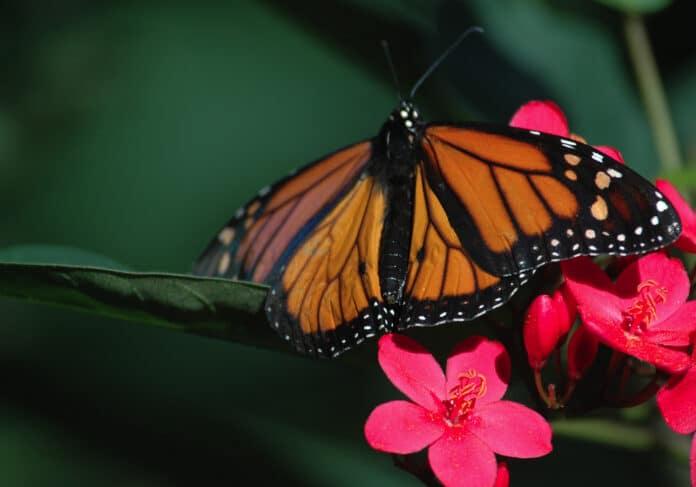The Monarch Butterfly needs your help! The monarch butterfly or Danaus plexippus is without a doubt one of the most popular and best known of the Lepidopterans. Monarchs are popular in modern society. Their image can be found on stationary, birthday cards, mugs, Halloween costumes and even used for weddings. Unfortunately, the native habitat of this iconic butterfly is disappearing. In fact, this species is starting to decline at an alarming rate due to loss of habitat, pesticides and other factors. In 2002, a severe winter killed over 80 percent of the overwintering colony in Sierra Chincua, Mexico. The monarch is not listed as endangered, but in August 2014 the Xerces Society, Center for Biological Diversity, Center of Food Safety and Dr. Lincoln Brower petitioned the Secretary of the Interior to place the status of the monarch as “threatened.”
The Monarch butterfly is found throughout the United States, from California to South Dakota and here in Florida. Monarchs are beneficial pollinators. The valuable nectar from native wildflowers and other suitable plants provide the fuel source for its biggest challenge, which is the great monarch migration. The monarch migration is beyond epic. Most of the monarchs migrate to specific destinations in Mexico. Millions of monarchs make this perilous journey across the border to escape the freezing weather. Some who witness this migration say that there are so many butterflies you can actually hear the wings of the Monarchs in flight. Monarchs look fragile, but are very strong fliers. Monarchs can remain in flight for 11 hours straight and can travel a continuous distance of over 600 miles.
To sustain their population, monarchs must mate and reproduce. The host plants of choice belong in the milkweed family. Native milkweeds such as butterfly milkweed (Asclepias tuberosa), white swamp milkweed (Asclepias perennis), Pink swamp milkweed (Asclepias incarnata) and the rare pinewoods milkweed (Asclepias humistrata) are all used by monarchs and their cousin, the queen butterfly. Monarchs lay eggs on these plants and in a short time these eggs hatch into caterpillars. The caterpillars will eat the leaves and when it is time, they will then pupate into a chrysalis. Once this stage is complete, the magical metamorphosis into an adult begins. Once the adult or imago hatches, the monarch stretches its wings in the morning sun. Once its wings are dry, it takes flight and the circle of life begins again.
What can you do to help the Monarchs? Purchase native milkweeds and introduce them into your landscape. Flowering plants such as pentas, blanket flower, salvias, dune sunflower, plumbago, coreopsis and native wildflowers will supply the nectar for the adults. Reduce your pesticide use and manage pests responsibly. Avoid using pesticides on or near your host and nectar plants. For more information, contact UF IFAS Extension Hernando County at 16110 Aviation Loop Drive, Brookville 34604. Telephone: 352-754-4433. Office hours are 8 to 5 Monday thru Friday. Master Gardeners are also available to answer questions at the Spring Hill Lowe’s from 10 to 2 on the 1st and 3rd Saturday of the month. For great prices on plants and gardening advice, visit the Master Gardener nursery at 19490 Oliver Street, Brooksville 34601 (behind the county fairgrounds), any Wednesday or Saturday from 9 to noon (weather permitting). UF/IFAS Extension in Hernando County provides solutions for your life. Extension programs are open to all persons without regard to race, color, sex, age, disability, religion, or national origin.

